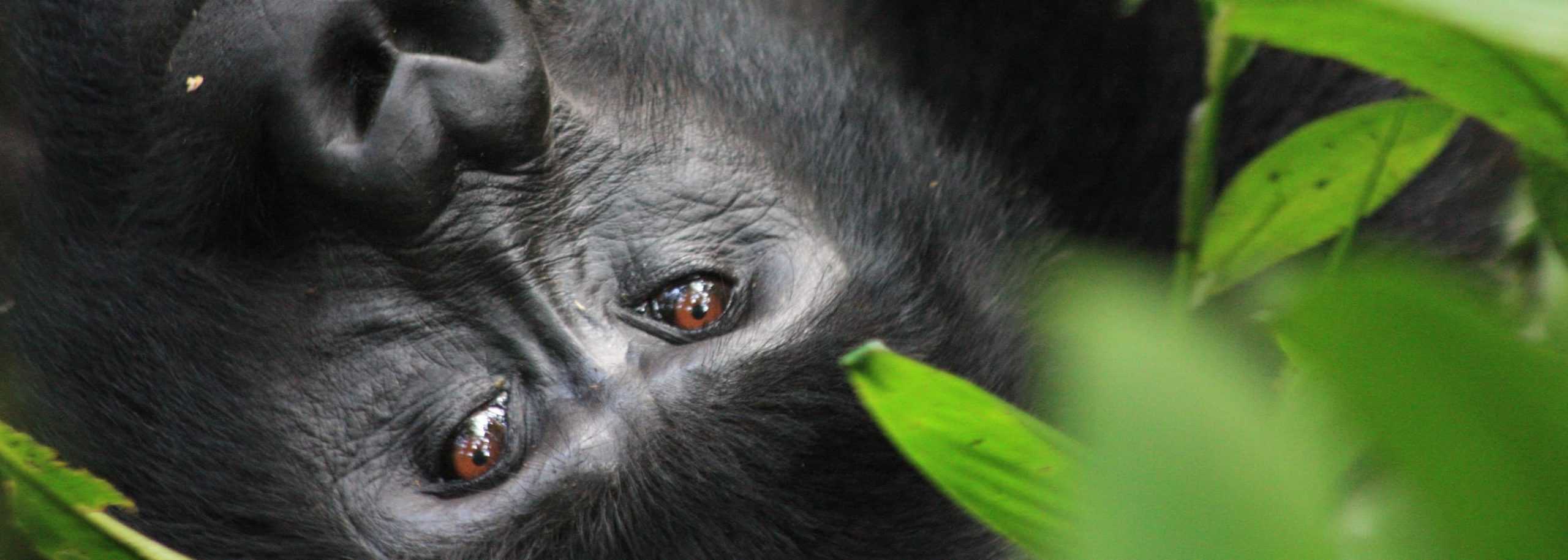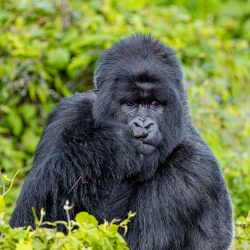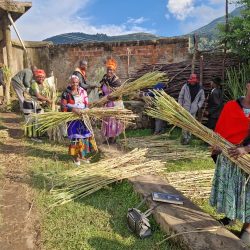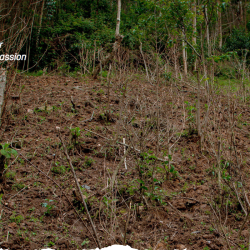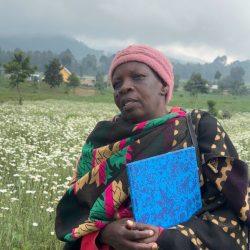A day in the Life of a Mountain Gorilla Census Participant
Blog | 30/09/25
Deep in the beautiful Bwindi Impenetrable national park, where the iconic mountain gorillas live, dedicated teams of field staff are combing the impenetrable forest for signs of mountain gorillas to aid the new count of mountain gorillas in the Bwindi – Sarambwe ecosystem.
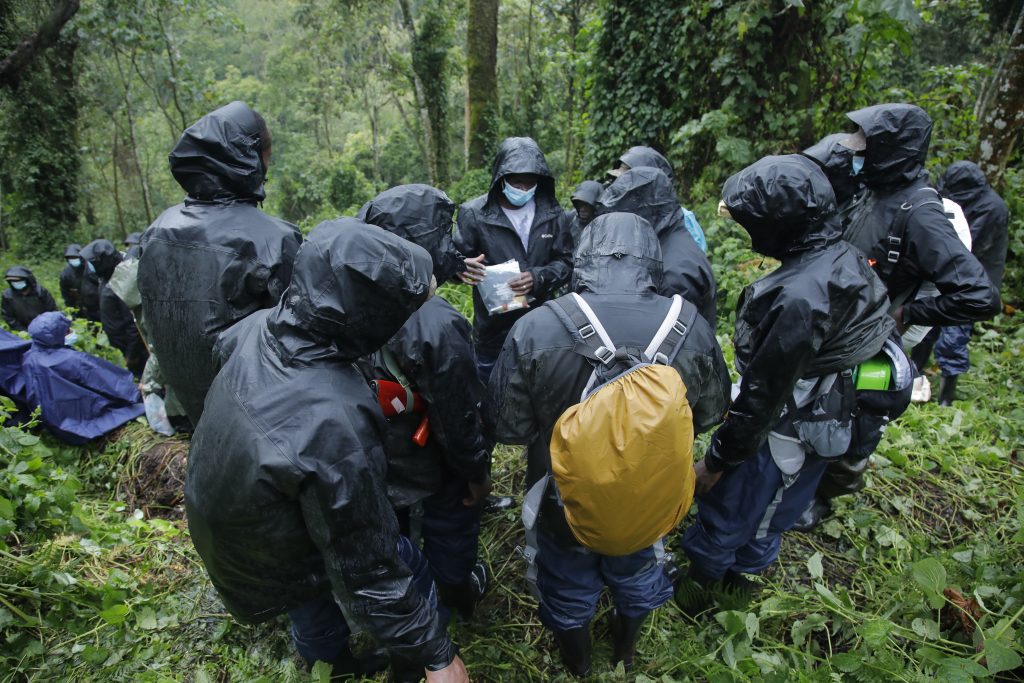
Contrary to what you might expect, counting mountain gorillas doesn’t actually involve physical counting of individual gorillas. Survey teams instead search for signs of mountain gorillas, such as trails and footprints, and use these to locate gorilla nest sites, where they collect faecal samples that are stored and used for genetic and pathogen analyses.
Census teams pitch camp in the forest and work on a two weeks rotational basis, 3 teams comprising of 6 people at a time. Because the work that they do is intense, in difficult terrain and amidst unpredictable weather, the teams ensure to start the day very early and end it early too to enable them to return to the camps in time.
Ismael Bakebwa, a ranger in BINP and census team leader says that their day starts at 6:00am. They wake up, bathe, have breakfast, pack their bags with the key requirements for the day e.g. maps, markers, GPS, smart phones, rain gears, water bottles, lunch, etc. The teams then meet in their different groups with their team leaders and review the recces for the day. “Bwindi is very cold in the morning, but we bravely face every new day and ensure to quickly get ready and start on our work” Ismael says. “Reviewing the recces at the start of every new day helps to remind the team of the route that they’ll be taking that day,” Ismael adds.
At about 8:00am the teams systematically start moving on foot looking for signs of mountain gorillas including trails and footprints which they follow to find nests and poo. When they find them, they record the nest sites and collect fecal samples in clearly marked tubes. “When we find a trail or nest, we decide on which one to follow/use depending on its freshness. Usually, we settle for those that appear to be less than 3 days old. Freshness is determined by the leftover food, dung or broken tree branches and leaves,” Ismael explains.
Once the teams have finished picking the samples, they leave a sample stick to indicate that they have been there, or that they’re done with that particular nest before moving to the next one.
Apart from collecting gorilla fecal samples, the teams also collect information on human or illegal activities in the park e.g snares and bee hives set up in the park, stake cutting and the presence of other wildlife sharing the habitat with the mountain gorillas.
According to Ismael, once it gets to 2:00pm the teams start planning to go back to the camp. This is because the paths can be impassable sometimes due to bad weather and the terrain making it hard for the teams to reach the camp before dark. On a normal day the teams reach the camps at 5pm. Averagely the teams move a distance of about 15KMs daily, so physical fitness, commitment and endurance are key in doing this work.
Penetrating the Impenetrable
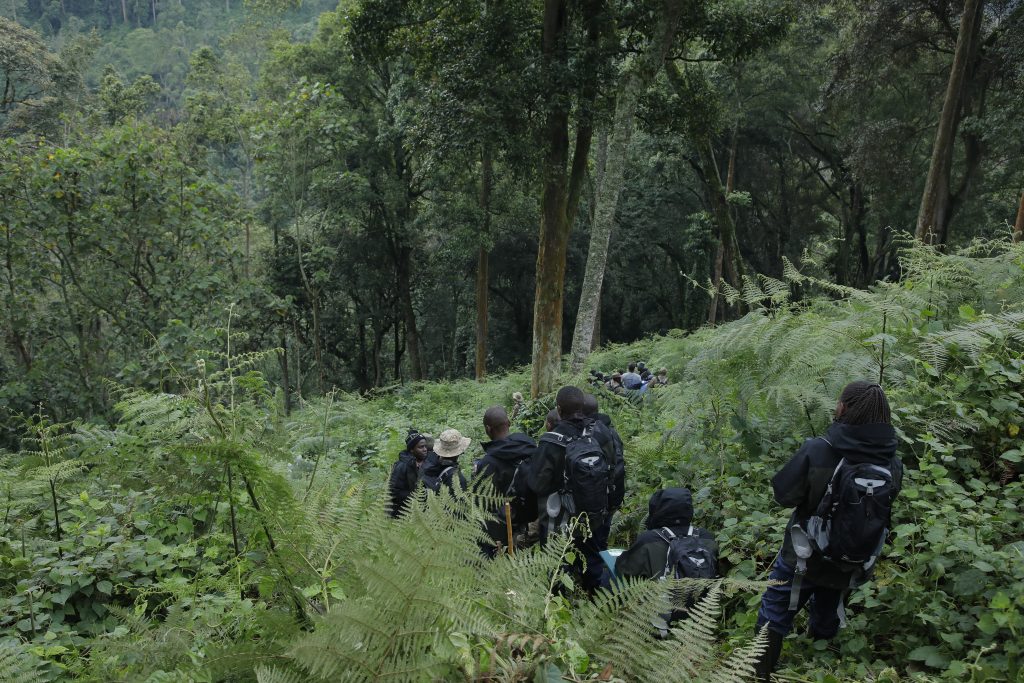
Bwindi is hilly, steep, with thick vegetation – at times thorny, flooding rivers and streams especially during the rainy season. Some parts of the forest are also very muddy, swampy, slippery with many gulleys here and there. Pangas, good quality protective gears – gloves, raincoats, gum boots and walking sticks come in handy.
Clearly the forest is not for the faint hearted. Ismael says that there were times in the past when the teams would have to go through flooded rivers to get to the other side of their path/forest to continue the search. “One time we found when river Mbwa had flooded. Unable to cross we waited for two hours for the volume to reduce then we crossed” Ismael says. Ismael adds that sometimes the teams have to walk about 1-2Kms along the riverbank to find a safe crossing point.
As unpredictable as it can be inside the forest, Ismael once missed his step and tripped into a mud pot. “I once got stuck in mud in sector BB. I got submerged almost halfway my body that my teammates had to pull me out” Ismael shares. Some individuals have sustained injuries from falls due to the slippery ground and wounds from the pangas and tree branches. Nonetheless the teams have support each other with first aid and do not let these challenges stop them from working.
“Resilience and teamwork are very important during the mountain gorilla census, without this, working and staying in the forest would be very hard” says Eustrate Uzabaho, census participant and IGCP field officer.
While the teams rely on their pangas to cut down thick shrubs, thorns and branches in their way, sometimes it is very difficult or even impossible to do, that the teams have to turn back and find an alternative route. This, however, means getting back late to the camp. “In the past some teams have reached their camps at 10pm after related experiences,” Ismael says.
Besides the bad terrain, vegetation and weather, teams also encounter aggressive wild animals like elephants and dangerous insects like wasps and bees. Individuals have on several occasions got stung by these or found themselves blocked by elephants. In the case of stubborn aggressive animals, the teams dodge them and find alternative routes or scare shoot (in the air) in extreme cases to get the animals out of the way, while for the wasps and bee stings the stung individuals are given immediate first aid for relief – thanks to the first aid training given prior to the field work.
“One time about six of us were seriously stung by wasps. It was very painful and bad. We immediately applied some recommended creams from our first aid kits, and we carried on with our work” Ismael shares.
At Camp
The teams start arriving at their respective camps at 5pm, exhausted, dirty and hungry. Thanks to the cooks at the camps, the teams find warm water to bathe and food to eat upon return. When they reach the camp the teams first of all unpack the collected sample tubes and transfer them to the storage bags, then freshen up, have meals, rest and regroup with their team leaders to assess the day and plan out the next day’s recce. Teams also check if their batteries are still full and enough to take them through the next day, and if not, they charge the devices and then move on to catch up with their colleagues. Individuals always look forward to this social hour, it is a time for fun! Because Bwindi is very cold, a campfire is always set up to light and warm up the place. This is where the teams gather to catch up, chat and laugh together. Since the teams are comprised of people from different fields and walks of life, the stories are always many, interesting and fun to listen to. Stories and jokes about so many things including their census, life and work experiences are shared and laughed about. “It is a time of bonding. Always fun, educational and refreshing. It actually strengthens our team spirit as we get to know each other better and helps to keep our spirits and hope alive” Ismael says.
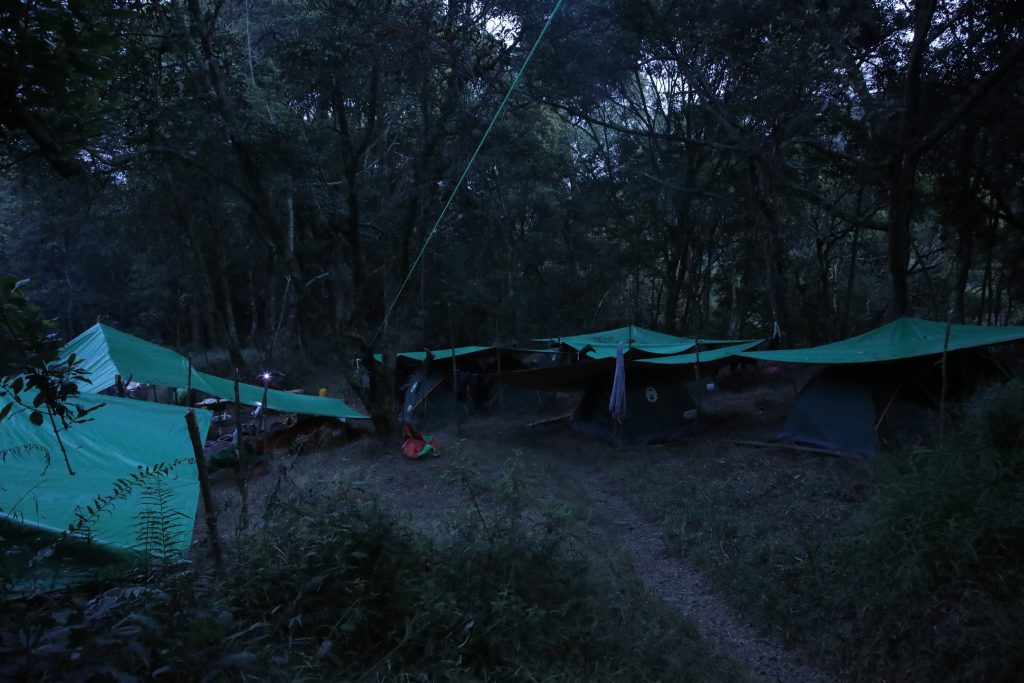
After an hour or two of chatting and laughing together the teams retire to their tents to sleep. Do they have beds, no! Individuals improvise with comfortable sleeping bags, going to bed fully dressed up in warm socks and sweaters helps a lot in keeping one warm through the night Ismael says.
Thanks to all the donors of the census that make it possible to purchase and equipe the teams with all the necessary work gadgets, food supplies, protective gears/wear, sleeping tents, sleeping bags and more.
